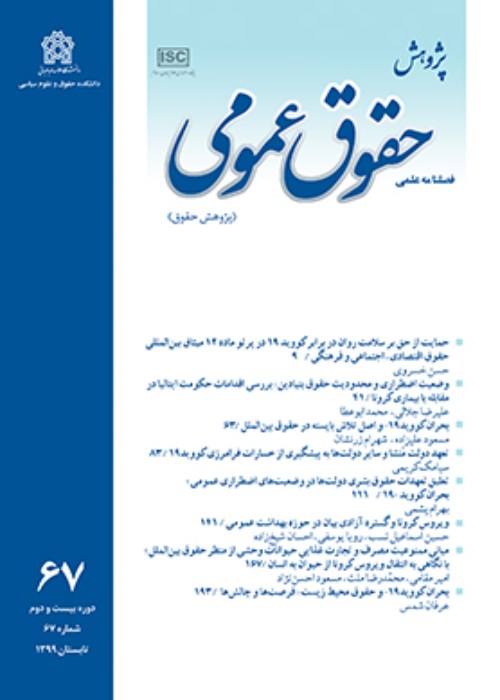The Role of Ombudsmen in Developement and Progression of Democracy
Author(s):
Abstract:
In every society, power is deemed as an essential element for securing and maintaining sovereign governments worldwide; however, human history shows where it is not laid under control and supervision, in the absence of unaccountability to members of society, there is a likelihood of its inclination towards abuse of power and corruption. Meanwhile, even so the government structure may well be assumed as democratic, maintaining constant supervision over its various constituent elements and divisions is a prime objective destined, within a legal framework, to be achieved and that it requires efficient supervisory vehicles in place as to carry out duties of such grave importance. Notwithstanding that, it is a duty assumed primarily on judicial bodies to fulfill, prevalent complexity and bureaucracy in mazy aisles of courts coupled with lengthy proceedings therein, compelled some states establish organizations delegated to deal with complaints brought by people through non-judicial fast and brief process. These organizations were termed “Ombudsman” or non-judicial supervisory institutions. Nowadays, Ombudsman-providing the public with convenient non-judicial mechanism, through which their complaints against government are heard - is considered as an indication of political development and an inalienable part of effectively protecting basic rights of citizens living in democratic societies, to such extend that one may argue that the notion of a democratic and developed nation may not realize without independent and efficient Ombudsman in place. Indeed, by striking a balance between the interests of the people and the government to which they are nationals, Ombudsman function as powerful mean laying down the necessary foundation for realization of a favorable democracy. Accordingly, given their superb functionality and potentials, Ombudsmen may well serve the vital purpose of developing and institutionalizing a democracy by reinforcing its fundamental principles and satisfactory addressing of citizens grievances or petitions which may arise as a result of government wrongdoing. Adopting a question-oriented approach and through a descriptive-analytic method, this paper attempts to examine the relationship between democracy and Ombudsman as a non-judicial supervisory establishment; and respond to the questions of how and by what means may it globally contribute to development of democracy.
Keywords:
Ombudsman , Democracy , Non , judicial Supervision , Control
Language:
Persian
Published:
Journal of Public Law Research, Volume:15 Issue: 39, 2013
Page:
129
magiran.com/p1246768
دانلود و مطالعه متن این مقاله با یکی از روشهای زیر امکان پذیر است:
اشتراک شخصی
با عضویت و پرداخت آنلاین حق اشتراک یکساله به مبلغ 1,390,000ريال میتوانید 70 عنوان مطلب دانلود کنید!
اشتراک سازمانی
به کتابخانه دانشگاه یا محل کار خود پیشنهاد کنید تا اشتراک سازمانی این پایگاه را برای دسترسی نامحدود همه کاربران به متن مطالب تهیه نمایند!
توجه!
- حق عضویت دریافتی صرف حمایت از نشریات عضو و نگهداری، تکمیل و توسعه مگیران میشود.
- پرداخت حق اشتراک و دانلود مقالات اجازه بازنشر آن در سایر رسانههای چاپی و دیجیتال را به کاربر نمیدهد.
دسترسی سراسری کاربران دانشگاه پیام نور!
اعضای هیئت علمی و دانشجویان دانشگاه پیام نور در سراسر کشور، در صورت ثبت نام با ایمیل دانشگاهی، تا پایان فروردین ماه 1403 به مقالات سایت دسترسی خواهند داشت!
In order to view content subscription is required
Personal subscription
Subscribe magiran.com for 70 € euros via PayPal and download 70 articles during a year.
Organization subscription
Please contact us to subscribe your university or library for unlimited access!



